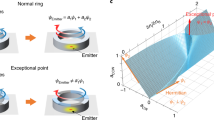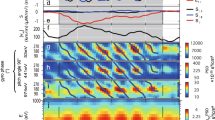Abstract
DR. MARTYN and I have already given a quantitative theory of the phenomenon known as the interaction of radio waves1. This theory has been found to be in good agreement with observation, and has in particular led to conclusions about the acoustic distortion of the impressed modulation which the subsequent observations of van der Pol and van der Mark adequately confirmed. There is, however, in this theory an inaccuracy of which I became aware about a year ago while engaged in a related investigation, and which at first sight appears of no great importance.
This is a preview of subscription content, access via your institution
Access options
Subscribe to this journal
Receive 51 print issues and online access
$199.00 per year
only $3.90 per issue
Buy this article
- Purchase on Springer Link
- Instant access to full article PDF
Prices may be subject to local taxes which are calculated during checkout
Similar content being viewed by others
References
Bailey, V. A., and Martyn, D. F., NATURE, 133 (Feb. 10. 1934); Phil. Mag., 18 (Aug. 1934).
Martyn, D. F., Proc. Phys. Soc., 47, 323 (1935).
Appleton, E. V., Proc. Roy. Soc., A, 126, 567 (1930).
World Radio, Feb. 8, 1935, p. 22.
Author information
Authors and Affiliations
Rights and permissions
About this article
Cite this article
BAILEY, V. Interaction by Resonance of Radio Waves. Nature 139, 68–69 (1937). https://doi.org/10.1038/139068b0
Issue Date:
DOI: https://doi.org/10.1038/139068b0
This article is cited by
-
Past, Present and Future of Active Radio Frequency Experiments in Space
Space Science Reviews (2018)
-
On the interaction of radio waves
Il Nuovo Cimento (1956)
-
Resonance in Gyro-Interaction of Radio Waves
Nature (1952)
-
A proposito dell’effetto Lussemburgo
Il Nuovo Cimento (1948)
-
Generation of Auroras by Means of Radio Waves
Nature (1938)
Comments
By submitting a comment you agree to abide by our Terms and Community Guidelines. If you find something abusive or that does not comply with our terms or guidelines please flag it as inappropriate.



